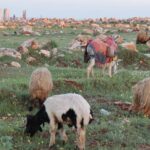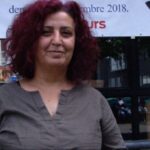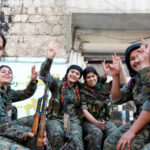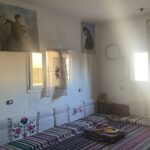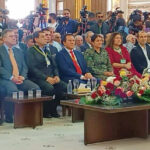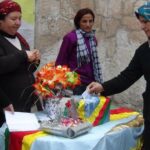Afrin (Arabic: عفرين, translit. ʿAfrīn or ʿIfrīn; Kurdish: Efrîn or Afrîn; Classical Syriac: ܥܦܪܝܢ) is the main city in the region of the same name in Northern Syria. It is considered part of Rojava (West Kurdistan).
The town and district are named after the Afrin River, which flows through the city, splitting it into two distinct halves. The olive tree is the symbol of Afrin. Afrin is a major production centre for olives. Olive oil pressing and textiles are some of the city’s local industry.
During the summer of 2012, shortly after the start of the Rojava Revolution, Syrian government forces withdrew from Afrin, and the city became part of the Rojava self-administration, eventually becoming part of the Democratic Federation of Northern Syria.
On 29 January 2014, Afrin Canton declared autonomy. The assembly elected Hêvî Îbrahîm Mustefa as Prime Minister, and she appointed Remzi Şêxmus and Ebdil Hemid Mistefa her deputies.
In August 2015, the University of Afrin started teaching, with initial programs in literature, engineering and economics, including institutes for medicine, topographic engineering, music and theatre, business administration and the Kurdish language.
On 20 January 2018, Turkish Air Force dropped over 100 bombs on Afrin.
On 18 March 2018, on the 58th day of the Turkish military operation in Afrin, the Turkish-backed Free Syrian Arm (TFSA) and the Turkish Armed Forces captured Afrin from the Syrian Democratic Forces (SDF). Shortly after invading the city, TFSA fighters looted parts of Afrin and destroyed numerous Kurdish symbols, including a statue of Kāve. Turkish Army troops raised Turkish flags and banners over the city.
There have since been numerous reports of horrendous crimes being committed in the city and surrounding areas.
The total population of the district was recorded at 172,095 in 2005, including 36,562 residents of Afrin city.
A very thorough collation of information about Afrin can be found here.

